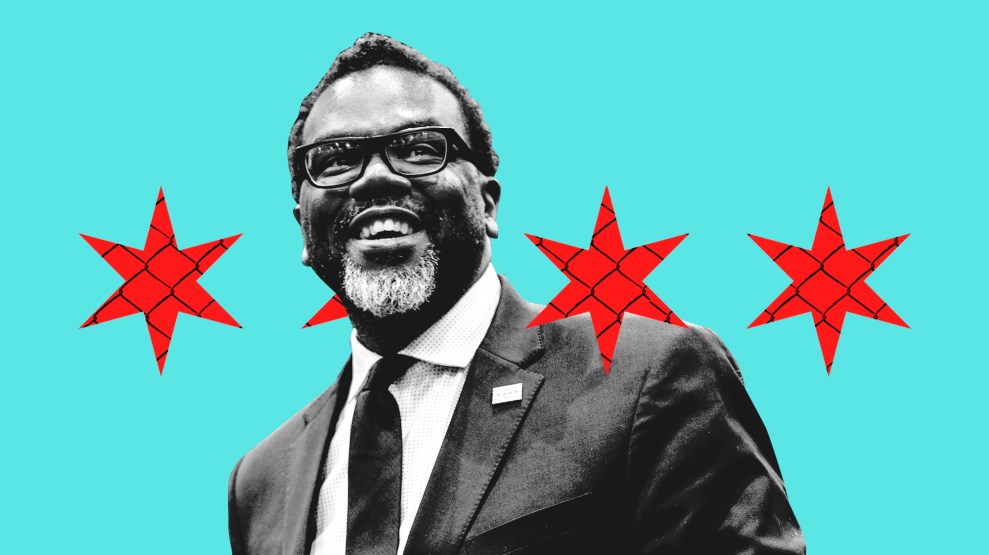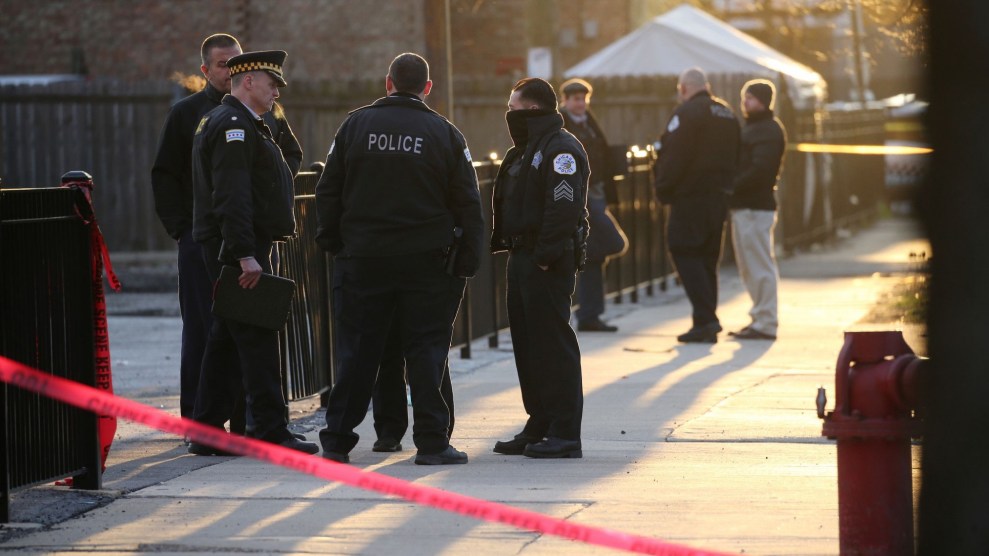
Mother Jones; Jim Vondruska/Getty
In the weeks leading up to Chicago’s mayoral election, polls showed that voters were especially concerned about crime. This led plenty of journalists and political pundits to suggest that the candidate with a tougher, police-centric approach to public safety would have an advantage. They were wrong.
On Tuesday, Brandon Johnson, one of the most progressive mayoral candidates in Chicago’s history, won in a stunning upset over his opponent Paul Vallas, who had backing from Chicago’s police union and raised more than double in campaign cash after vowing to hire more cops. Johnson, a former teacher and organizer with the Chicago Teachers Union, took a more holistic approach to public safety, pledging to address the root causes of violence by funding schools, housing, jobs, and mental health care. (He suggested increasing taxes on Chicago employers and raising levies on hotels and real estate sales over $1 million as a way to fund more community investments.)
Johnson won 51 percent of the vote, with nearly 99 precincts reporting. “Tonight is the beginning of a Chicago that truly invests in all of its people,” he said at his election night party on Tuesday, according to WBEZ, Chicago’s NPR station. “The heart of this movement,” Johnson said, “has always been about investing in people.”
Every election is unique, and Chicago’s mayoral race won’t tell us how voters might lean in other places. But Johnson’s victory does show that progressives can have a persuasive response to gun violence—one that neither denies it exists nor claims “law and order” as the only solution.
Johnson, who is Black, did not shy away from the problem of crime. He lives in a neighborhood on Chicago’s West Side that is no stranger to shootings, and said in his victory speech that he’s had to protect his kids “from bullets that fly right outside our front door.” Johnson argued during his campaign that the city needed to take a new approach to violence by focusing on community development and hiring more social workers, while also being smarter about police resources. He wants to promote cops internally and to increase the number of detectives by about 200, so the department can focus on closing cases.
Vallas, on the other hand, who is white and a former Chicago Public Schools CEO, pledged to greatly expand the overall police force by filling more than 1,700 department vacancies. He said Chicago was suffering from an “utter breakdown of law and order” and accused Johnson of wanting to defund the police—an allegation Johnson denied. In a 2020 radio interview, Johnson said defunding was an “actual, real political goal.” Recently, he walked back those comments, clarifying that it was not his goal. “I wouldn’t reduce the [Chicago Police Department] budget by one penny,” he said in March.
Still, Johnson does want to rethink how the department spends its money. He has argued that about $150 million of the police budget was allocated wastefully. One likely reform: Johnson opposes the police’s use of ShotSpotter, a gunfire detection technology that has been criticized for poor accuracy and for fueling police discrimination against communities of color.
If polling is to be believed, Johnson didn’t win despite crime. In fact, he may have won at least partly because of it. Like many cities, Chicago experienced a drastic increase in gun violence during the early pandemic. Though the number of shootings began to ebb last year, Chicago still recorded 697 murders in 2022. One election survey conducted for the conservative Manhattan Institute found that 57 percent of Chicagoans (and 61 percent of Black Chicagoans) believe the city is unsafe.
This fear likely contributed to Mayor Lori Lightfoot’s defeat in the February primary, as she became the first incumbent to lose reelection in Chicago since 1983. “Progressives have struggled to develop a persuasive response” to crime, the New York Times‘ David Leonhardt wrote in the popular Morning newsletter a day after her ouster. “The Chicago runoff” between Johnson and Vallas, he added, would be “the next test of whether a progressive message on crime can win in an overwhelmingly Democratic city.”
If Chicago’s election was a test, Johnson’s message of community investment passed. “In a survey of Chicago run-off voters on the eve of the election, we find a city deeply concerned about crime, especially violent crime, but also embracing a nuanced view of the causes of crime and potential solutions,” the advocacy group Vera Action and the national polling firm GQR wrote in a report on Wednesday, noting that a majority of the 750-plus likely voters surveyed said they favored a crime prevention approach focused on funding schools, jobs, housing, and health care, and fighting illegal gun sales.
Still, that does not mean reforms will be easy. Chicago’s police union president, John Catanzara, recently warned that hundreds of cops might leave their jobs if Johnson became mayor. “If this guy gets in we’re going to see an exodus like we’ve never seen before,” he told the New York Times, adding there would be “blood in the streets” as a result.
It’s unclear if the police union will follow through or try to impede Johnson’s reforms in other ways, but it wouldn’t be unheard of. In San Francisco, after progressive District Attorney Chesa Boudin came to office in 2020, cops resisted working with him, leading to massive frustration among voters that contributed to the DA’s recall last year.
Obstruction like this from the police can make it hard for local politicians like Johnson to fight crime outside traditional “law and order” frameworks, even if voters want them to. We don’t usually think of police unions as an issue of democracy. But maybe we should start.
















